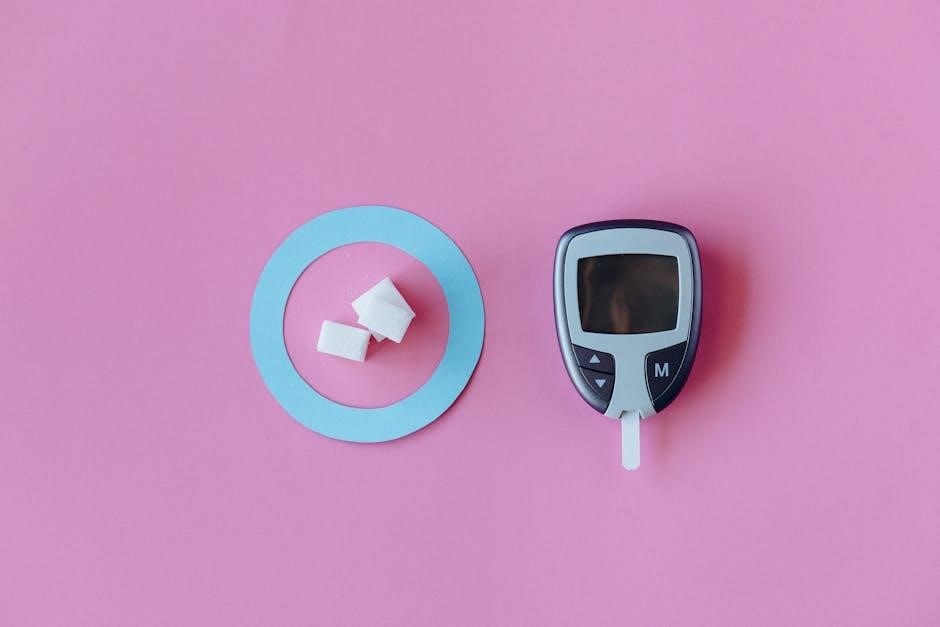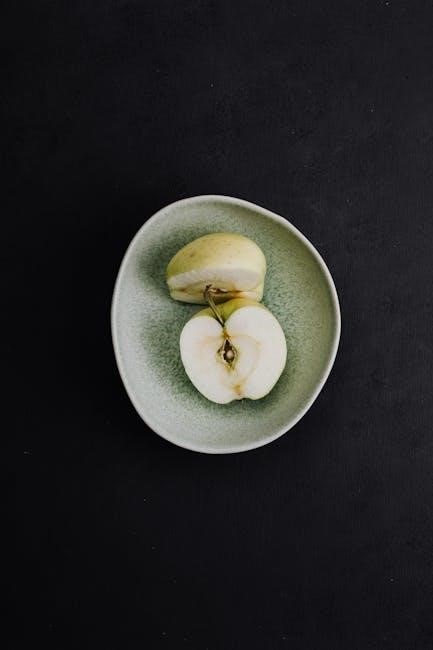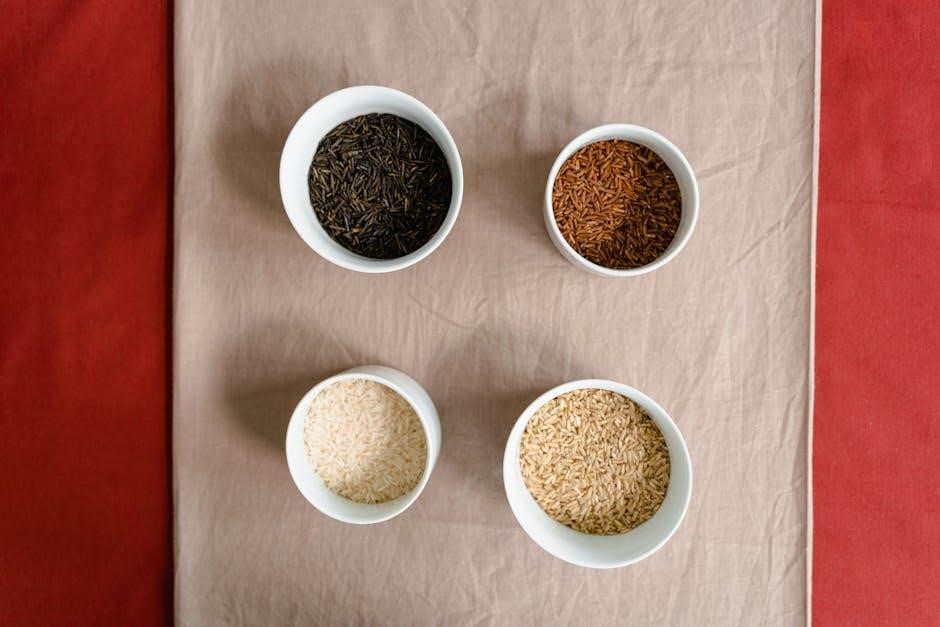b negative blood type diet food list pdf
The Blood Type B Negative Diet, developed by Dr. Peter D’Adamo, focuses on foods that promote optimal health for individuals with B negative blood type. This diet emphasizes consuming beneficial foods that enhance digestion, boost energy, and support overall well-being, while avoiding harmful ones that may cause health issues. By tailoring meals to your blood type, you can achieve better health outcomes and maintain a balanced lifestyle.
Overview of the Blood Type Diet Concept
The Blood Type Diet, developed by Dr. Peter D’Adamo, is based on the idea that your blood type determines how your body reacts to specific foods. For individuals with B negative blood type, the diet focuses on selecting foods that are biologically compatible to improve digestion, energy, and overall health. It suggests that certain foods contain lectins, proteins that can cause harmful reactions in people with specific blood types. By avoiding these lectins and incorporating beneficial foods, individuals can achieve better nutrient absorption and reduce health risks. This personalized approach to nutrition is designed to align with your genetic makeup, promoting a balanced and harmonious relationship between your diet and body.
Importance of Tailoring Your Diet to Blood Type
Tailoring your diet to your blood type is crucial for optimizing health and preventing potential illnesses. For B negative individuals, this approach ensures that the foods consumed are biologically compatible, reducing the risk of adverse reactions. By aligning your diet with your blood type, you can enhance digestion, boost energy levels, and support overall well-being. This personalized nutrition strategy helps prevent lectin-related issues, which can disrupt bodily functions. Eating right for your blood type also promotes better nutrient absorption and reduces inflammation, leading to a more balanced and healthy lifestyle. It’s a proactive way to address dietary needs and maintain long-term health benefits.

Beneficial Foods for Blood Type B Negative
B Negative individuals benefit from a diverse diet rich in lamb, turkey, and certain fish like cod. Dairy products, such as cottage cheese and goat milk, are highly beneficial, as are vegetables like kale, broccoli, and beets. Fruits such as apples, berries, and grapes are also compatible. These foods support digestion, energy levels, and overall health, making them ideal choices for a balanced B Negative diet.
Meat and Poultry Recommendations
For Blood Type B Negative individuals, lean meats like lamb and mutton are highly beneficial. Turkey and chicken are also good choices, while fish such as cod, flounder, and halibut are recommended. Avoid processed meats like bacon and ham, as well as seafood like shrimp and crab, which may cause adverse reactions. These protein sources help support digestion and energy levels, making them ideal for a B Negative diet. By incorporating these meats, individuals can maintain a balanced and nutritious eating plan tailored to their blood type.
Dairy Products and Eggs
Dairy products and eggs play a significant role in the Blood Type B Negative Diet. Cottage cheese, goat cheese, and kefir are highly beneficial, as they support digestion and overall health. Feta, ricotta, and mozzarella are also recommended, while yogurt and skim milk can be consumed in moderation. Eggs are considered neutral but are a great source of protein. These dairy options help balance the diet and provide essential nutrients. However, it’s important to avoid overconsumption and focus on variety to maintain a well-rounded diet. Incorporating these foods can enhance energy levels and support immune function, making them a cornerstone of the B Negative dietary plan.
Vegetables That Support Blood Type B
Vegetables play a crucial role in the Blood Type B Negative Diet, offering essential nutrients and supporting overall health. Leafy greens like kale, spinach, and broccoli are highly beneficial, as they promote digestion and energy levels. Beets, beet greens, and bok choy are also recommended for their nutrient-rich properties. Asparagus, arugula, and bamboo shoots are excellent choices, while cabbage, collard greens, and mustard greens can be included in moderation. These vegetables help maintain a balanced digestive system and support immune function. Incorporating a variety of these veggies into your meals ensures a well-rounded diet tailored to your blood type, enhancing vitality and overall well-being.

Fruits and Berries Compatible with B Negative
Fruits and berries are a delicious and nutritious addition to the Blood Type B Negative Diet. Apples, bananas, and berries like blueberries, strawberries, and raspberries are highly beneficial, offering antioxidants and natural energy. Citrus fruits like oranges and grapefruits can be consumed in moderation, providing essential vitamins. Other recommended fruits include pears, peaches, and kiwis, which support digestion and overall well-being. These fruits help balance blood sugar levels and enhance vitality. Incorporating a variety of these fruits into your diet ensures a nutrient-rich and satisfying meal plan tailored to your blood type, promoting optimal health and longevity.

Foods to Avoid for Blood Type B Negative
Certain foods can hinder health for B Negative individuals. Corn, wheat, and some meats may cause digestive issues or inflammation. These should be limited or avoided entirely.
Meats and Seafoods to Limit or Avoid
For individuals with B Negative blood type, certain meats and seafoods can trigger adverse reactions. Avoid pork, bacon, and processed meats like ham and sausages, as they may cause inflammation. Additionally, seafoods such as shark, swordfish, and anchovies should be limited due to their potential to disrupt health. These foods may slow digestion, reduce energy, and increase susceptibility to illness. It is also advisable to minimize consumption of ground beef and lamb unless they are lean and organic. Ensuring a balanced diet by focusing on highly beneficial meats like turkey and lamb can help maintain optimal health and prevent potential sensitivities associated with B Negative blood type.
Dairy and Eggs That May Be Harmful
While B Negative individuals can enjoy a variety of dairy products, certain options should be avoided to maintain optimal health. Cheeses like blue cheese, Gouda, and Edam may cause inflammation and should be limited. Additionally, processed dairy products such as American cheese and ice cream can negatively impact digestion. Eggs are generally beneficial, but overconsumption or non-free-range eggs may lead to sensitivities. It is also advisable to avoid high-fat dairy products like cream and whole milk, as they may slow metabolism. Balancing dairy intake with moderation and choosing high-quality, low-fat alternatives can help support overall well-being for B Negative individuals.
Vegetables and Fruits to Exclude
For individuals with B Negative blood type, certain vegetables and fruits should be avoided to prevent potential health issues. Corn, lima beans, and olives are among the vegetables that may cause inflammation or digestive discomfort. Additionally, cabbage, Brussels sprouts, and cauliflower can disrupt thyroid function. When it comes to fruits, tropical varieties like mangoes and papayas should be avoided, as they may trigger allergic reactions. Citrus fruits like oranges and grapefruits can also be problematic for some individuals. Moderation is key, and focusing on beneficial foods is essential for maintaining a balanced diet tailored to your blood type.

Health Benefits of the Blood Type B Diet
The Blood Type B Diet offers numerous health benefits, including improved digestion, increased energy levels, and enhanced overall well-being. By tailoring your diet to your blood type, you can experience better weight management, reduced inflammation, and a stronger immune system. This personalized approach also helps prevent chronic illnesses and boosts vitality, ensuring long-term health and wellness.
Improved Digestion and Energy Levels
Adhering to the Blood Type B Negative Diet can significantly enhance digestion and energy levels. By avoiding foods that cause inflammation or digestive discomfort, such as corn, wheat, and certain meats, individuals with B negative blood type can experience improved nutrient absorption and reduced bloating. This tailored approach allows the body to function more efficiently, leading to increased vitality and stamina. The diet emphasizes foods like lean meats, green vegetables, and low-fat dairy, which are easily digested and provide sustained energy. Regular consumption of these beneficial foods helps maintain optimal digestive health, reducing fatigue and promoting a more energetic lifestyle. Over time, this can lead to enhanced overall well-being and a greater sense of vitality.
Weight Management and Enhanced Well-being
The Blood Type B Negative Diet is designed to support weight management and enhance overall well-being. By focusing on foods that align with your blood type, such as lean meats, vegetables, and low-fat dairy, you can maintain a healthy weight and improve your metabolic balance. Avoiding inflammatory foods like corn, wheat, and certain seafood helps reduce unnecessary weight gain and supports a more balanced metabolism. This diet also promotes the consumption of nutrient-rich foods, which contribute to better energy levels and a stronger immune system. Over time, adhering to the Blood Type B Negative Diet can lead to improved health markers, such as lower cholesterol and blood pressure, further enhancing your overall well-being and quality of life.

Practical Tips for Following the B Negative Diet
Meal Planning and Grocery Shopping
Plan weekly meals and shop for approved foods like lean meats, vegetables, and low-fat dairy to stay on track with your B Negative diet plan.
Plan your meals weekly using the B Negative food list to ensure you only consume beneficial foods. Create a grocery list with items like lean meats, vegetables, and low-fat dairy. Shop for fresh, seasonal produce to maximize nutrition and flavor. Consider batch cooking to save time and stay consistent with your diet. Organize your pantry with approved grains, oils, and spices. Avoid impulse buys by sticking to your list. This structured approach helps maintain compliance with the B Negative diet, fostering better digestion, energy, and overall health. Regular meal planning also reduces the temptation to eat harmful foods, keeping you on track with your dietary goals.
Sample Meal Ideas for B Negative Blood Type
Start your day with scrambled eggs, spinach, and a slice of whole-grain toast. For lunch, try grilled lamb or turkey with roasted vegetables like kale and carrots. Include a side of quinoa or brown rice for a balanced meal. Snack on fresh berries or a handful of almonds. Dinner could feature baked cod with steamed broccoli and sweet potatoes. Smoothies made with goat milk, banana, and berries are a great option for a quick breakfast or snack. Incorporate fresh herbs like parsley and dill to enhance flavor. These meals are tailored to support digestion, energy, and overall health for B Negative individuals, ensuring you stay nourished and satisfied throughout the day.

Adopting the Blood Type B Negative Diet can lead to significant improvements in health and well-being. By focusing on beneficial foods like lean meats, dairy, and vegetables, individuals can enhance digestion and energy levels. Avoiding harmful foods such as corn and wheat helps prevent health issues. While scientific evidence supporting this diet is limited, many followers report positive results. Personalizing your diet based on blood type offers a unique approach to nutrition, emphasizing harmony with your body’s needs. For B Negative individuals, this tailored plan can be a sustainable and effective way to achieve long-term health goals. Always consult a healthcare professional before making major dietary changes to ensure the best outcomes for your specific needs and lifestyle.
